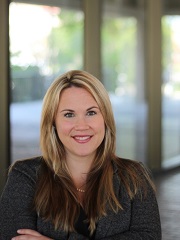
Spring 2020
Implementation Science & Behavioral Health: An Interview with Dr. Leah Zullig
Allison A. Lewinski, PhD, MPH✉; Population Health Sciences SIG member

Leah Zullig, PhD
Implementation science is a rapidly growing and evolving area of research in the US and abroad. The main goal of implementation science is to increase the uptake, timeliness of uptake, and spread of evidence-based interventions and practices. My research interest is in health services and nursing research, specifically in developing and implementing sustainable interventions to improve health outcomes. As an early career investigator, I aim to develop meaningful interventions that are relevant, appropriate, and can be implemented in real-world clinical settings with interdisciplinary collaborators. For that reason, I chose to interview Leah Zullig, PhD to gain insight into this emerging area of research as well as obtain advice for researchers just starting out.
Who is Leah Zullig, PhD?
I am a health services researcher and implementation scientist. I examine cancer care delivery and quality, promoting cancer survivorship and chronic disease self-management. I am an investigator at the Durham Center of Innovation to Accelerate Discovery and Practice Transformation at the Durham Veterans Affairs Medical Center, and an Associate Professor in the Duke Department of Population Health Sciences. I lead and collaborate on implementation science research both nationally and internationally.
What is an implementation scientist?
As an implementation scientist, I partner with individuals in a variety of academic, industry, healthcare, and community settings to apply rigorous research methods to implement and sustain effective interventions. This work often involves engaging with healthcare system leaders, clinicians, pharmacists, patients and others to understand the context in which we’re working and how to implement something with an eye toward not disrupting existing clinical workflows. I also guide and support individuals in considering how they can best support implementation, evaluate evidence-based programs, proactively plan for adapting evidence-based interventions, and consider when an intervention should be removed from practice.
How did you get into implementation science?
During my doctoral training I worked as a project coordinator in a health services research group at the Durham VA. In this role, I oversaw evidence-based interventions that were tested in a health care system and successfully improved health outcomes but were still not implemented into clinical practice. This nagged at me. Later, during my career development award, I focused on training about how to reduce the gap between research and clinical practice. When I became aware of the field of implementation science I was immediately excited. This emerging field of implementation science really addressed what I wanted to do—implement interventions that were sensitive to context and had a real-time impact on clinical practice and the health system.
What makes you excited about implementation science?
First, I have found the implementation science community to balance scientific rigor and exciting methodology with a welcoming, collegial, and collaborative spirit. Second, implementation science is multi-disciplinary. It is energizing to work with people from different disciplines, academic or industry roles, clinical backgrounds, communities, and environments. I also get to meet and work with researchers or stakeholders who have developed all types of innovative, evidence-based interventions. It’s rewarding to watch individuals adapt their interventions to be more successful. I also really value that the work that we do as implementation scientists has the potential to improve population health. That real-world impact is important.
What types of skills are key to succeeding in implementation science?
Implementation science is a team sport, and an implementation scientist may serve as a PI or a co-investigator on projects. Based on my experience, I would say that successful implementation scientists have two complementary skill sets:
- Technical skills: Operational knowledge of implementation science frameworks; familiarity with the historical underpinnings of implementation science; appreciation for stakeholder engagement; and respect for intervention fidelity while balancing adaptation is crucial.
- Communication and leadership skills: Ability to manage and work within a multidisciplinary team; respect for other viewpoints, roles, perspectives; desire to incorporate stakeholders in projects; humility; and being open to learning from other individuals who have different experiences.
What advice would you give to someone who wants to learn more about implementation science?
There are many formal training and mentoring opportunities to learn about implementation science. Such trainings are a fantastic opportunity because they can connect you with cutting-edge knowledge as well as mentoring in the field.
Any final thoughts?
This is an exciting time to be in implementation science. The field is expanding, and the demand is great. I am constantly learning something new with each research project I that complete!